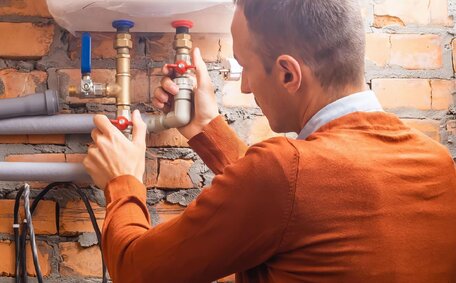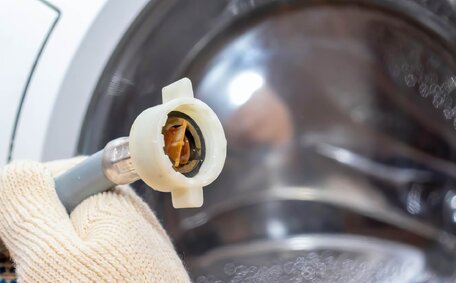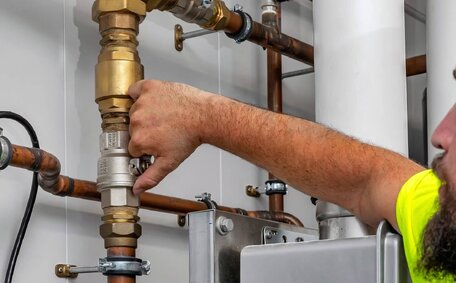Introduction to Preventing Blocked Sink Drains
Keeping your household kitchen sink drains free-flowing is crucial for the convenience of day-to-day activities around your kitchen sink and bathrooms. Blocked pipes can quickly become frustrating, leading to unpleasant odours, backed up water, and potential damage if left unchecked.
Preventing clogged sink drains is straightforward with the right strategies, allowing homeowners to easily avoid blockages. This article provides practical measures for homeowners to prevent clogged drains, ensuring your pipes remain unobstructed. We’ll examine the reasons why clogged pipes can compromise your home’s plumbing system, and actions to take regularly to prevent blockages.
While regular maintenance is essential, professional assistance plays a key role in preventing complex blockages. Joining forces with your local trusted plumber is a wise move for drain inspections and maintenance on a regular basis. This piece guides you in practical at-home strategies to ensure proactive care for your drainage system, yet our team is ready to assist and resolve your concerns.
Common Causes of Blocked Sinks
Common culprits of sink drain blockages include:
- Hair: Strands of hair that go down the drain can accumulate and break down over time, tangling with soap residue to create dense clogs.
- Grease, fat, and oil: When these substances find their way into your drainage, they can congeal upon cooling, clogging up pipes and joints.
- Discarded items like coffee grinds can accumulate within drains, stubbornly clinging to the pipe walls and causing blockages.
- Soap scum partners with hair and debris to form stubborn clogs.
Knowing how oil and food debris contribute to blockages helps you stay proactive in keeping your drains clear. Simple preventative actions are things you can do to mitigate the risk of clogged drains by managing the disposal of cooking grease, using hair traps, and regularly using boiling water.
Preventing Blocked Drains
Adopt these straightforward habits to prevent blockages in kitchen and bathroom sinks:
- Employ a drain strainer in your sinks to capture food scraps, drain hair, and other waste before it can make its way down the drain
- Dispose of used cooking oil in a heat-resistant container rather than washing it down the sink
- Dispose of liquid waste in the sink and avoid flushing wet wipes or paper towels down the toilet, using it only for toilet paper
- Regularly run hot water down the drain for a minute or two weekly to dissolve grease and maintain clear water flow
Handy drain maintenance tasks you can do once a month may include:
- Remove clogs efficiently using a plumbing snake or plunger to break up and dislodge debris, keeping drains clear
- Regularly use an eco-friendly drain cleaner to unblock and prevent clog build-up in your drains.
- Dispense one cup baking soda followed by a cup of white vinegar down drain, allowing it to work its magic overnight when sinks are idle
Collaborating with a professional for annual drain cleaning and inspections can prevent issues in your outdoor drains. Heed the signs blocked that signal a drain issue, such as gurgling noises or slow-draining sinks, by promptly calling in a professional.
Use Drain Strainers and Filters
Utilising drain strainers is your best defense to intercept unwanted materials before they make their way down and add to clogs.
You can use strainers that sit snugly under your drain basket, acting as a sieve to catch debris like food scraps, hair, and soap scum. This precaution ensures things like larger particles do not find their way down shower drains and obstruct other parts of your drainage system.
Choose a fine mesh stainless steel strainer for your garbage disposal to effectively capture food scraps. Make use of devices designed to catch drains your hair, such as stopper covers in your bathroom, for an effective blockade. Just remember to remove any accumulated debris from sink strainers and filters regularly.
Some benefits of using drain strainers and filters include:
- Catch food waste before it finds its way down into your drain pipes
- Prevent buildup of hair, grease and food particles
- Easy to install and remove for cleaning
- Inexpensive solution for most households
Combine the use of sink strainers with consistent maintenance to ensure your drains remain clear. Since some debris can still enter pipes over time, complement strainers with enzymatic drain cleaners and hot water treatments for thoroughly clear drains.
Proper Disposal of Fats, Oils and Grease
Knowing how to prevent fats, oils, and grease from entering your pipes can protect against severe plumbing problems. As these substances cool, they can solidify and cause blockages, potentially damaging your pipes. Follow these tips to prevent blocked drains from improper disposal of substances:
- Collect cooled fats, oils, and grease in a sealed container instead of allowing them to enter the drain. Glass jars or empty tin cans work well.
- Absorb small amounts of oil or grease with paper towels instead, then throw in your garbage.
- Don’t put hot water into play to flush grease, as this simply moves the obstruction further along the drain pipe.
By disposing of oil grease correctly, you can battle the buildup that often brings about those dreaded blocked drains.
Regular Drain Maintenance
Establish a routine for plumbing system maintenance to prevent clogs and future blockages. Simple tasks like these can prevent drainage issues when performed weekly, using baking soda and vinegar treatments overnight, and opting for natural soda vinegar solutions can maintain the integrity of your plumbing.
Pour boiling water down kitchen and bathroom sink drains regularly to prevent fat and oil accumulation.
You can maintain your sink trap by not pouring grease oil down and using a blend of baking soda and vinegar occasionally.
Choose more natural solutions and create your own remedies where feasible. If you notice persistent drain blockages or very slow water drainage even after treatments, contact a professional plumber for assistance to prevent further issues.
When to Call a Professional Plumber
While regular maintenance and preventative steps can go a long way in keeping drains free-flowing, there are times when a professional plumber is needed to properly address blocked drains.
Signs of a blocked drain that suggest it’s time to call a professional include:
- Water backing up or overflowing from your sink, tubs, or shower drain
- Very slow drainage (longer than 30 seconds) even after boiling water or drain treatments
- Gurgling sounds coming from pipes
- Unpleasant sewer gas smells coming from drains
- Multiple drains in your home blocked at once
Saint Marys Plumbing excels in resolving issues that cause blocked drains, effectively tackling tough clogs like tree roots. Our team uses state-of-the-art drain cameras to locate blockages, hydrojetting to clear clogged areas, and drain repairs or replacements when needed.
Our services also address plumbing issues related to hair buildup, gunk, and more:
- Hot water system installation and repairs
- Burst pipe identification and repairs
- Toilet repairs and replacements
- General taps and leak repairs
Our round-the-clock emergency plumbers swiftly resolve issues to restore drainage and water flow throughout your home and garden. Contact our friendly team or schedule an appointment online.
Conclusion
Preventing blocked drains is substantially more convenient than addressing clogs and subsequent backups. This article has provided various practical steps for homeowners, such as using sink strainers, avoiding fats and oils in drains, and treating pipes with boiling water and natural cleaners.
Adopting these simple habits, combined with professional drain maintenance by experts like Saint Marys Plumbing, helps safeguard against the annoyances of blocked sink drains.
With 24/7 availability and extensive experience, we have the tools and expertise to tackle tough drain clogs and ensure water flows freely.
For reliable plumbing services or urgent assistance with blocked drains, contact Saint Marys Plumbing on 1300 349 338 or [email protected]. Our friendly, local plumbers are here to help.






